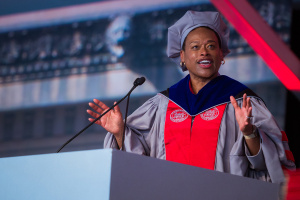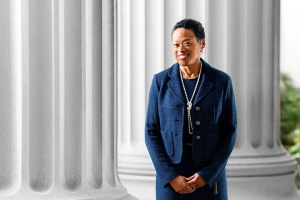
Melissa Nobles
Chancellor
Class of 1922 Professor of Political Science
Comparative Politics; identity; transitional / retrospective justice; violence; Brazil; US South.
Biography
Melissa Nobles is Chancellor and Class of 1922 Professor of Political Science at the Massachusetts Institute of Technology.
As chancellor, Melissa Nobles is responsible for overseeing more than 60 interconnected offices that support undergraduate and graduate students’ academic success, foster community and wellbeing, and cultivate personal and intellectual growth. Chancellor Nobles works closely with senior leaders to develop and implement the Institute’s strategic priorities.
Throughout her distinguished career at MIT, Nobles’ leadership has resulted in the creation of a new theater building and a forthcoming music building, which will be a state-of-the-art center for music research, innovation, and performance. Nobles also championed the pioneering “MIT & Slavery” research class; secured new support for graduate students, postdocs, and professorships in SHASS; and launched several labs focused on digital humanities, music technology, election data and science, and climate action.
Nobles’ teaching includes graduate courses in transitional justice, ethnic politics, and nationalism as well as undergraduate courses in comparative politics, Latin American studies, ethnic conflict in world politics, and social movements in comparative perspective. Her international, comparative research focuses on restorative justice in light of ethnic and racial conflicts. She is the author of two books, Shades of Citizenship: Race and the Census in Modern Politics (Stanford University Press, 2000) and The Politics of Official Apologies (Cambridge University Press, 2008), and is the co-editor with Jun-Hyeok Kwak of Inherited Responsibility and Historical Reconciliation in East Asia (Routledge Press, 2013). Her work has also appeared in the Annual Review of Political Science, Comparative Politics, Social Research, Daedalus, American Journal of Public Health, and several edited books.
Her current research is focused on examining racial murders in the American South, 1930–1954. Working closely as a faculty collaborator and advisory board member of Northeastern University Law School's Civil Rights and Restorative Justice law clinic, Nobles has conducted extensive archival research, unearthing understudied and previously unknown racial murders, and contributing to several legal investigations. In fall 2022, the Burnham-Nobles Digital Archive was publicly released for scholarly and public use. She contributes to the US national dialogue about racial equity through thoughtful research-based commentaries that draw on her scholarship in the field.
Nobles graduated from Brown University with a degree in history and received her MA and PhD in political science from Yale University. She has held fellowships at Boston University's Institute for Race and Social Division and Harvard University's Radcliffe Center for Advanced Study. She has served on the editorial boards of Polity, American Political Science Review, and Perspectives on Politics as well as a guest editor for a special issue of Nature. Nobles has also been involved in faculty governance at MIT and beyond, serving as associate chair of the MIT faculty from 2007 to 2009, and vice president of the American Political Science Association.
Research
Professor Nobles' teaching and research interests are in the comparative study of racial and ethnic politics, and issues of retrospective justice. Her first book, Shades of Citizenship: Race and the Census in Modern Politics (Stanford University Press, 2000), examines the political origins and consequences of racial categorization in demographic censuses in the United States and Brazil. Her second book, The Politics of Official Apologies, (Cambridge University Press, 2008), comparatively examines the political uses of official apologies in Australia, Canada, New Zealand, and the United States. At present, Prof. Nobles is conducting research for a third book manuscript that will analyze the prospects for "transitional justice" in the American south. This book, and related projects, proposes to include the southern region of the United States in the comparative study of democratization and transitional justice. For a variety of reasons, which the book will examine, the south is not often included in comparative study.
Recent Publications
"Democratic dilemmas of census categorization in the post-civil rights era," in How Public Institutions Assess Identity Claims, ed. Avigail Eisenberg and Will Kymlicka. University of British Columbia Press, in press.
"The Prosecution of Human Rights Violations," Annual Review of Political Science, (2010) 13:165-82.
The Politics of Official Apologies .New York: Cambridge University Press, 2008).
"Reparations Claims: Politics by Another Name," Political Power and Political Theory, (2007) 18:253-258.
"The Myth of Latin American Multiracialism," Daedalus, (2005) 82-87.
"Lessons from Brazil: The Ideational and Political Dimensions of Multiraciality," in The New Race Question: How the Census Counts Multiracial Individuals, ed. Joel Perlmann and Mary Waters, New York: Russell Sage Foundation press. (2002).
"Racial Categorization and censuses," in Census and Identity: The Politics of Race, Ethnicity, and Language in National Censuses, ed. David I. Kertzer and Dominique Arel. Cambridge University Press, 2001.
Teaching
| 17.50 | Introduction to Comparative Politics |
| 17.523 | Ethnic Conflict in World Politics |
| 17.504 | Ethnic Politics I |
| 17.516 | Transitional Justice |
News
Biography
Melissa Nobles is Chancellor and Class of 1922 Professor of Political Science at the Massachusetts Institute of Technology.
As chancellor, Melissa Nobles is responsible for overseeing more than 60 interconnected offices that support undergraduate and graduate students’ academic success, foster community and wellbeing, and cultivate personal and intellectual growth. Chancellor Nobles works closely with senior leaders to develop and implement the Institute’s strategic priorities.
Throughout her distinguished career at MIT, Nobles’ leadership has resulted in the creation of a new theater building and a forthcoming music building, which will be a state-of-the-art center for music research, innovation, and performance. Nobles also championed the pioneering “MIT & Slavery” research class; secured new support for graduate students, postdocs, and professorships in SHASS; and launched several labs focused on digital humanities, music technology, election data and science, and climate action.
Nobles’ teaching includes graduate courses in transitional justice, ethnic politics, and nationalism as well as undergraduate courses in comparative politics, Latin American studies, ethnic conflict in world politics, and social movements in comparative perspective. Her international, comparative research focuses on restorative justice in light of ethnic and racial conflicts. She is the author of two books, Shades of Citizenship: Race and the Census in Modern Politics (Stanford University Press, 2000) and The Politics of Official Apologies (Cambridge University Press, 2008), and is the co-editor with Jun-Hyeok Kwak of Inherited Responsibility and Historical Reconciliation in East Asia (Routledge Press, 2013). Her work has also appeared in the Annual Review of Political Science, Comparative Politics, Social Research, Daedalus, American Journal of Public Health, and several edited books.
Her current research is focused on examining racial murders in the American South, 1930–1954. Working closely as a faculty collaborator and advisory board member of Northeastern University Law School's Civil Rights and Restorative Justice law clinic, Nobles has conducted extensive archival research, unearthing understudied and previously unknown racial murders, and contributing to several legal investigations. In fall 2022, the Burnham-Nobles Digital Archive was publicly released for scholarly and public use. She contributes to the US national dialogue about racial equity through thoughtful research-based commentaries that draw on her scholarship in the field.
Nobles graduated from Brown University with a degree in history and received her MA and PhD in political science from Yale University. She has held fellowships at Boston University's Institute for Race and Social Division and Harvard University's Radcliffe Center for Advanced Study. She has served on the editorial boards of Polity, American Political Science Review, and Perspectives on Politics as well as a guest editor for a special issue of Nature. Nobles has also been involved in faculty governance at MIT and beyond, serving as associate chair of the MIT faculty from 2007 to 2009, and vice president of the American Political Science Association.
Research
Professor Nobles' teaching and research interests are in the comparative study of racial and ethnic politics, and issues of retrospective justice. Her first book, Shades of Citizenship: Race and the Census in Modern Politics (Stanford University Press, 2000), examines the political origins and consequences of racial categorization in demographic censuses in the United States and Brazil. Her second book, The Politics of Official Apologies, (Cambridge University Press, 2008), comparatively examines the political uses of official apologies in Australia, Canada, New Zealand, and the United States. At present, Prof. Nobles is conducting research for a third book manuscript that will analyze the prospects for "transitional justice" in the American south. This book, and related projects, proposes to include the southern region of the United States in the comparative study of democratization and transitional justice. For a variety of reasons, which the book will examine, the south is not often included in comparative study.
Recent Publications
"Democratic dilemmas of census categorization in the post-civil rights era," in How Public Institutions Assess Identity Claims, ed. Avigail Eisenberg and Will Kymlicka. University of British Columbia Press, in press.
"The Prosecution of Human Rights Violations," Annual Review of Political Science, (2010) 13:165-82.
The Politics of Official Apologies .New York: Cambridge University Press, 2008).
"Reparations Claims: Politics by Another Name," Political Power and Political Theory, (2007) 18:253-258.
"The Myth of Latin American Multiracialism," Daedalus, (2005) 82-87.
"Lessons from Brazil: The Ideational and Political Dimensions of Multiraciality," in The New Race Question: How the Census Counts Multiracial Individuals, ed. Joel Perlmann and Mary Waters, New York: Russell Sage Foundation press. (2002).
"Racial Categorization and censuses," in Census and Identity: The Politics of Race, Ethnicity, and Language in National Censuses, ed. David I. Kertzer and Dominique Arel. Cambridge University Press, 2001.
Teaching
| 17.50 | Introduction to Comparative Politics |
| 17.523 | Ethnic Conflict in World Politics |
| 17.504 | Ethnic Politics I |
| 17.516 | Transitional Justice |






